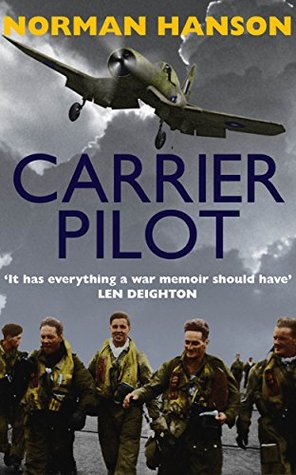Adventures in Bookland: Carrier Pilot by Norman Hanson

There’s a strange new fashion in publishing to make a book’s subtitle into an advertising blurb. Browse Amazon – particularly its Kindle pages – and you will see books with, right there on their title lines, advertising bumph such as ‘the most uplifting and romantic novel’, ‘the gripping, bestselling Richard & Judy book club thriller’, and in the case of Carrier Pilot, ‘one of the greatest pilot’s memoirs of WWII – a true aviation classic’.
Well, I’m here to tell you that it’s not. That’s not to say Carrier Pilot isn’t a good book: it’s a fine read. But it’s not in the category of books that transcend the limitations of being a memoir and thus being limited to a particular man’s experiences and memories. However, what it does do is tell Norman Hanson’s story very well, of how he ended up training to be a pilot with the Royal Fleet Air Arm and sailing over to America in 1942 to be trained as a pilot in Florida. Indeed, the vast majority of the book is concerned with training: flying a plane is difficult enough. Taking it off and landing it again on the truncated runway of an aircraft carrier pitching on the ocean makes it all an order of magnitude more difficult and dangerous.
In fact, that’s what comes across most clearly in Hanson’s memoir: just how dangerous the training was. Although I did not tally the deaths up exactly, my impression was that as many pilots died in training as died in combat – perhaps even more. Hanson and his colleagues were not helped by having to fly the F4 Corsair, a plane of which Hanson says, in the book’s most memorable phrase, “of all the aircraft I had ever seen, these were the most wicked-looking bastards. The Corsair looked truly vicious.” These first Corsairs were vicious, and utterly unforgiving of pilot error. This is where the book is strongest, showing the cost and courage required even to learn to fly these planes.
So while not a true classic, Carrier Pilot brings new light to a discipline (fleet air flying) and a theatre (the British in the Far East) that have received relatively little attention and thus makes a worthy addition to any WWII library.
0 Comments